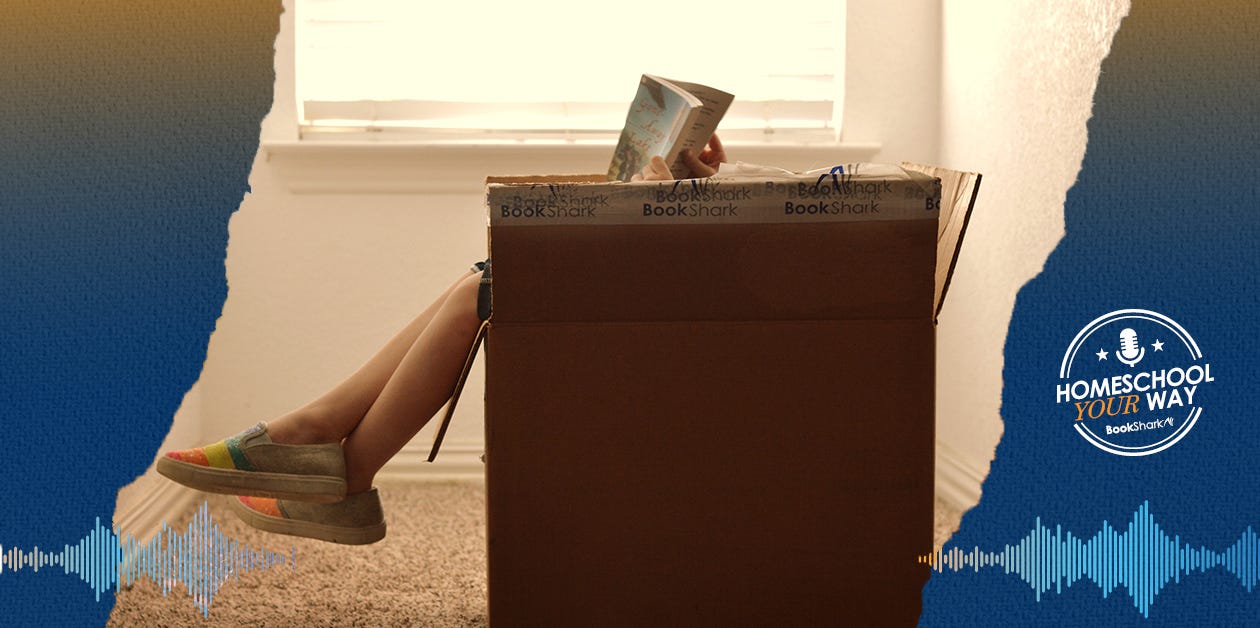THE ADVENTURE OF HOMESCHOOLING PRE-K-12TH: PART TWO
-
 By
BookShark Homeschool Curriculum
By
BookShark Homeschool Curriculum
- Nov 28, 2023

EPISODE 154| Part two of THE ADVENTURE OF HOMESCHOOLING PRE-K-12TH: PART ONE. Continue the conversation with Janna and her guest Katie Wolfe as they discuss the flexibiltiy of homeschool and why and how you can create the most helpful curriculum for your student.
Why do you homeschool? There are any number of answers to that question and sometimes homeschooling comes before or after a bout with public school and at times homeschooling co-exists with public schooling. Does the idea of homeschooling feel daunting? Listen as Janna and her guest Katie Wolfe discuss Katie’s journey of homeschooling her son from pre-k to 12th grade and how she learned that just because you homeschool does not mean you do it all yourself!
Haven't read or listened to part one? Get it here.
As part of being our guest Katie is offering $5 off on her site https://thewolfepackden.com/. Use code TWP5BSK.
ABOUT OUR GUEST| Katie Wolfe is a former classroom teacher who will graduate her one and only kiddo from their Lone WOLFe Academy in 2024. She's a firm believer that homeschool moms don't need to actually "do it all"...they just need to find the right resources and then manage the process. This belief has allowed her to create and share hundreds of quality printable resources, travel the country with a renowned math teacher, and serve as chairperson on her local library board (in addition to homeschooling and doing her best to cook and clean too.) She lives with her little family, mini Aussie, bearded dragon, massively fluffy cat, and mixed terrier in the middle of Kansas.
Listen to this podcast episode
Podcast Transcript
Katie 00:00: He had an assignment I met where he had to connect like, one word to another part of the sentence or something. And he would like literally, like, go like this. And then connect it, and then the next one he got and connect it. And at first, I was like, You can't do that. I can't keep track of what it is you're doing. And then I thought, I couldn't have done that with 30 kids in the classroom. But I sure as heck can do that with one kid. And so I would just watch him do the answer. I'm like, Yep, that's right. That's right. That's right. He knows what he's doing. And he's having fun while doing it. Now, that's not to say that you have to allow that kind of not behavior, but that kind of choice on their part, like, I was, like, Fine, if that's how you're gonna have fun doing this, then do it, I know that you're learning it. And you know, if you keep doing that, in college, people might laugh at you, but you know, whatever you do you. But my point being is like, you know, what you worry about when they're four, or five, or six, or seven, or even what you worry about when they're doing is 11. Um, you know, a lot of is just maternity and age, and they're just, they're doing what they're supposed to be doing at that age. And they will, you know, mature out of that and grow out of it. And, you know, I doubt he's going to do that when he gets to college, or he'll do it once. And then somebody will look at him funny, and he won't do it again, you know, so not creating Word people.
Janna 01:22: No, and who's to say that the way we did it was the right way. I mean, I look back at my education I did public, I did private, and I homeschooled. And I could tell you, the pros and cons and the things that were great in each of those and the things that were horrible in each of those. And so, you know, from socialization, I had a horrible experience in junior high at a private school for socialization. zation. So if you want to mark that is like the reason you shouldn't homeschool, I could talk an hour as to why homeschool was the best choice for me in that moment. And then, you know, so I would the things that worked me up over the years, and honestly still work me up with teenage daughters, I have to stop and just ask myself, Is this about me? Is this about my expectation? Is this about what I think they should be doing? Or how I think it should be done? Or like your example? Doesn't really matter? Like, why do we have to put emphasis on things that don't matter, but homeschooling is a parent magnification, of all your idiosyncrasies, and you're gonna have to be willing to take an honest look at you know, and I've said this again, I'll continue to say, because I think it really does make a difference between a thriving homeschool experience, and a mediocre homeschool experience is like, are you willing to get out of your own way?
Katie 02:55: Yep, absolutely, absolutely. I referenced my first year of homeschooling, I was so excited to do it. And you know, I had and David was really eager to learn. So man, I had our basement set up like a classroom, just like my classroom before, with a switch, which we actually love. Like, he loved what we had established with that, but the schedule that I have for him, was like, basically, the schedule I'd use for my first graders and school, and very quickly learned that that was a ridiculous idea. I don't know where I thought, you know, I was getting that from that was going to make sense. And it was a disaster. And we adjusted but I didn't just quite as quickly as I probably should have. But even when you really feel like you know, best, stop and stop and reassess, like do that constantly. Like, you know, you need to be re assessing your children, whether you give them you know, red marks and grades is one thing, but you need to be assessing their learning all the time. Because all this that you're trying to teach them you need to make you need to assess whether they're learning it or not. And you can do that for yourself. You need to assess what you're doing all the time. And the reason for assessment is to see if it's working and adjust if needed. And that goes for your kids learning. And you like you've got to constantly just like be in it's on judging yourself. It's not that it's just like, oh, did that work? Did that not work? Oh, that didn't work. We're going a different direction. And you know, be be wary of what you see on Facebook in terms of like what everybody else is doing. Especially in for me getting to the high school years. It was like stress like that was like his eighth grade year when thinking about high school and like knowing there's only this many years left and like looking what everybody else was doing, you know, like dual enrollment and eighth grade and taking the pre AC t when you're in seventh grade and all this kind of stuff. You're like Oh, and you start comparing yourself. I had never I'd never been one to compare until then. And that was really that was that was detrimental to me and to like What we did that year because I was like, just constantly, like, Am I doing enough? Am I doing it right? Am I doing it, and I was just judging what we were doing wrong. And I know I took a lot of that out on, you know him as well. Like I made him stop, stop sitting on top of his desk, do his work. I'm kidding, he stopped long before that. But you know, just like be aware like not to compare yourself. You know, use some benchmarks, but find benchmarks that you believe in and that you have confidence in and, you know, not the random person on Facebook, who tells you that you're doing it wrong, like just find something that gives you a sense of peace that you are doing, that you're on the right track, and keep reassessing it. But you know, just be aware of homeschooling needs to look the way it needs to look for you. And don't forget, that means it'll look different for somebody else. So what they're doing is not what you need to do unless you match up perfectly. And you know, great, but just be aware of that, because it is so easy to lose your confidence when you start comparing yourself to what others are doing. So
Janna 06:03: yeah, I think growth is really important. So are they growing? Are they is there progression, then to me? That's progress, right? I don't care what another 14 year old girl is doing in this maybe in the same class, like I just don't care. I just want to know that my daughter is learning and that she's growing. And there's progress, because that is the most important. Katie, I think that's something that some listeners may be asking and the burning question of maybe want to know, as a homeschool mom to one. What did you do intentionally, to create community for your son?
Katie 06:44: That's a great question. And I will tell you, up until eighth grade, I literally took every opportunity I could to go out and do something with David, I created a co-op so that there was a Keepalive live in a small community. But I created a co-op with a friend. And so we had a coop that we met once a week, super involved with made all of his friends, their youth group, we also did a book club, which was actually our favorite thing. Some of the same kids, but not always the same kids. We did rec center staff, we did sports we did like literally because I was worried that I needed to. Because when you have an only child, and it's only child who's homeschooled, all socialization is going to be outside the house or you have to bring it into your house, but it's not built it. It's just not. And so I always laugh when homeschoolers get offended at the socialization question, but it's a legit question. It's a legit concern for homeschooling and Oh, my child, it really is. I mean, there's just no two ways around it, you cannot not create those social situations for your kid. So we did everything that was open to us. That's one of the mistakes I will say I made. Now when I got to like the middle school years, I could look back and be like, Hmm, that was probably a bit much. But we probably should have spent more time, you know, doing math or whatever it was, but it was like that was probably that much that I felt. But I felt this pressure, this internal pressure to make sure that I didn't create an obviously unsocialized homeschooler because you know, we don't want that. Exactly. So but there are so I again, I live in a small town, the opportunities are out there, whether it's a rec center class, when they're, you know, five years old, or the baseball league, you know, there's so many different opportunities, but you definitely have to go out and do those things. An only child who's homeschooled doesn't have to take turns. He doesn't have to share. He doesn't have to, you know, I had a friend who had five kids, and she was always like, Why do you make David what he likes for lunch every day? And I'm like, because why wouldn't I? You know, I mean, like, why would I purposely create a meal he doesn't want to eat? I get it. We have five kids, not everyone's gonna want to eat the same day. But it's like, why why? Like, purposely do that, you know? But chances are, you've been out to him out to a restaurant with him at a restaurant he didn't want to go to he survived. He was perfectly fine. You know what I mean? It's like, so anyway, home and only child at home all day long definitely creates different challenges. The other thing too, is attention. Um, when you're done homeschooling for the day, or dad's doing lessons for the day, or whatever it is you're doing, you can't necessarily just be like okay, go off on your own now I'm Mommy's gonna go do this. They still want to do stuff with you because you're going live. So it's either like technology or it's whatever you're doing with mom. So yeah, you definitely have to look for the social opportunities though, but they're out I believe that they're out there. I think the if they're not, you can create ate something creative, even if it's just a book club with four other kids, and they don't have to be the same age, you know. Or, for one year or two years, we just did science with his best friend, like his mom and I use the same book. And we just did science. And once a week, we met and did the science experiment for the week. And so it's like, just stuff like that, you just have to, you have to kind of think outside the box, but you definitely have to, you know, you can't ignore socialization with an only child who's homeschooled, it's just, it's not an option.
Janna 10:32: So you've got to you got to find those things, or create them, I would imagine it becomes extra challenging when your only child is not an extrovert.
Katie 10:41: Yeah, um, and I would say, David is not an extrovert, except when he needs to be. He's definitely like a one-on-one kind of person, or small group kind of gruesome, like he has one best friend who happens to be an only child, he was homeschooled, so they've got that's the only thing that's the only thing they have in common, though, they are opposites and everything else, but they have a phenomenal relationship, because they really understand, you know, one another's lives. But, yeah, like he didn't, he still doesn't even like to, um, you know, like, he can drive now. But he doesn't like to, like, go to the store and get something for us. He's like, people, you know, like, he loves it. You know, I mean, you back and he's a very, he's so easy to be around. But only the people he wants to be around, I guess, but I don't know.
Janna 11:30: Yeah. Sometimes people forget personalities, when they hear homeschool, right? They, just want to lump it all together. Right. But we still have children with individual personalities. And some are extroverted, and some are not. I know that in my household, the one child that will love to go do things for us, wants to bring someone else with her to do them. So she's the first one that will go to the store. But she like goes through the whole house who wants to go to store with me? He wants to go store with me. Right? So like, I mean, it's so interesting, because you can have socialization problems with introverts in a public school, too. Right? Absolutely. Really knowing your child, knowing their limits, knowing what they're comfortable with. I have one that she's one of my twins. And I said, you know, we just knew you couldn't have been an only child. Like, if it wasn't meant to be from the beginning, which is why you have your Yang to your Yes, for sure. But you know that it's like that, that push and pull, like you have to know your kids have when you sign them up for something, when to insist that they finish and not quit, but also to allow them to quit when it's too much for them emotionally. And so I really encourage parents that you know, whether there's 18 people in your house or five, three people in your house, right? It's knowing your own child and being intuitive to their needs. Not in a catering or pandering kind of way. But it gets it can get complicated.
Katie 13:06: Absolutely. We had a lapse of last year, yes. Last year, I signed David up for a live class. That was a class of the subject he needed. I spent a lot of time researching. It ended up being the worst class ever for him. He was miserable from the very beginning. As I said, he takes his studies really seriously. But for a variety of reasons, the class was a disaster for him. And he was he's very open and communicated with us. And so he told us about, you know, the process. And at first were like, well, you just put a lot of money while you're doing it, you know. And so we kept pushing. I mean, we listened and we, and we tried to like help help him find ways to navigate it and make it work. But it just got worse and worse until about mid-December. We're like, okay, we're letting it go. Because it was stressful to him. He was like, literally the entire time he was in class like his stomach was upset. And he was just like, he No, he was not learning because it was such a horrible environment. And we're like, alright, but money is out the window. I mean, you know, not to make light of money. But like mice out the window, we will find something else just we're moving on. And I mean, it took me a while to get there. And my husband got there before I did. But that's what you have to do. It's like it's not a failure. And this is a sort of side note, I want to add to it. Like that doesn't need to be considered a failure. It was just like, that didn't work. And, you know, thank God, it wasn't public school where we couldn't have made the change, you know, I mean, it's like, why are we homeschooling him if we cannot make things work and it wasn't that he wasn't doing the work it was it just was not a good fit. And on that note, don't be afraid like if you do outsource something or if you buy a curriculum like whatever, don't be afraid to why I'd be sick of sales like fire the person because like, at first, my big thing was like we can't quit can't be a quitter, can't quit, can't quit, quit, quit. And then I'm like, wait a minute, we hired this person paid a lot of money to do this for us. It's not working, we're not quitting, we're firing you. In the end. We didn't say that to him. This person necessarily, but it was like, that's what it was. It was like, you're working for us. We're not doing you a favor. You're working for us. We're not quitting. We're firing you. This is not working, we're going to replace you with something else. And like, once I realized that, I was like, Oh, that's a relief. Now, granted, you can't, you know, buy 12 math curriculum every year financially, that's crazy. It would also create a lot of math gaps, just, you know, aside. But if it's not working, fire that book, or fire that company, or fire that person or whatever, and replace it with something else that works and just like constantly be reassessing. Obviously, the fewer changes you have to make, especially when you're the better, but don't be afraid to make those if you need to. And, again, personalize it for each child if possible. And pay attention because as classroom teachers, we always like to say we differentiated for kids. Okay, we did to a degree, you cannot do that with 30. Kids, you can't I mean, it's impossible, that you can do that with one or two or three, or I mean, the biggest family I know is seven, you can put you can differentiate for seven kids, you really can't. Financially that might be you know, more complicated, obviously, but like you can differentiate that learning, so do it otherwise, you know, there might as well be in the classroom with 30 kids all doing the same thing.
Janna 16:41: Yeah, I think that's an important point for parents to hear that you are in charge. And if it's not working, does it say less about your child, sometimes and more about the style? And it's okay. It really is okay. Katie, I know that you have put a lot of time and effort into your unit studies that you've created. And I would love for you to so quickly tell our audience where they can find the things that you have done originally for David, but now you are gracing the rest of us with the ability to get those things. Yeah.
Katie 17:20: And I'll briefly tell you why. So I'm not gonna remember the year but he was little and it was an election. And I wanted to teach him about the election. And I could not find it was the presidential election, I should say, I could not find something that I wanted to use that seemed neutral, and like was at his level and blah, blah, blah. And so I was like, looking and I was like, Oh, I don't care if I have to pay for it. Like I can't find anything. BookShark probably has something. But I don't know if they had it years ago.
Janna 17:48: We do. Actually we do have an election.
Katie 17:53: Yeah, good. Yeah. But this, I mean, this was a lifetime ago. And so I created something. And then that introduced me to like Teachers Pay Teachers like, oh my gosh, there's all these things out here. So that's what started it. So in I would always like create things for co ops and stuff, because I liked them to be exactly what I wanted to teach or whatever. So I have a lot of things like that, like I just made a new Veterans Day pack because, and I learned a lot like I was like F didn't really excited about Veterans Day, you know, like, there's nothing you have to understand Veterans Day. But if you want to learn about it, you know, I've got something there's other obviously other things out there. But I think it's important for our kids to understand these current events are these holidays, that we're always talking about things that are on the news. So I do a lot of that kind of stuff. And you can find it at the wolf pack den.com And I don't know if we can put a link in there or something like that. But we Yeah, and I love I love it. Of course, obviously don't do it for David anymore, but I do proofread stuff like it's supposed to work for.
Janna 18:53: That's right. Well, there are parents like myself, who have no desire at all to create anything. Original, I just don't, I'm too I don't have it. And I'm okay with that. I'm totally fine with that. I'm like listen, I have no desire but I know other people do. So let's find those people so I can use my energy in different ways. And that's typically getting us lost on a hiking trail. So I memories. Jamie's been lost with me biking trail. Katie, before we go, I would love for you to share a homeschool hack that has worked for your family that might encourage them now, some of our listeners today.


Katie 19:36: Sure. Now I will say I wish I had used this homeschool hack a lot earlier than I did. But my homeschool hack would definitely be outsourcing subjects or even part of a subject when needed and when I say when needed that means when you need it, or when your kid needs it, or both. But outsource like there are experts out there Somebody that can just make it more fun but can make it you know, explain something better. That has the the joy behind it that they want to like, give it to you, like just outsource find people out there to do little parts of your homeschooling for you. I believe firmly believe that homeschooling means you homeschool your way. And if that means that you know you pay someone to do science, great if you pay someone to do math, fabulous, or if you do it all yourself, but like don't be afraid to outsource. I wish I had outsourced. I especially wish I'd outsource math sooner. So definitely like, know that that's an option out there. And don't listen to anybody that my biggest hack is don't listen to anybody who tells you you're not homeschooling the right way. Homeschooling was the name of your podcast homeschooling into your way, like whatever that looks like, you get to design that and that is yours. And so don't listen to anybody who's telling you you're not doing it the right way. That's my biggest homeschool hack. I guess.
Janna 21:04: Don't listen to the people who listen to us. We don't we don't know we're doing. Find out. That's right. That's right. I'll speak personally, I don't know what I'm doing. But what I do, I do enjoy. So Katie, I have really enjoyed this time with you, we will make sure to put all of the links to get the curriculum, you've created your you have free resources on your site. So we'll make sure that our listeners can get a hold of that information. And I want to thank you so much for taking the time. I hope that we can get David on at some point to kind of follow up and get his perspective on his homeschool situation. Now that we've put you under the magnifying glass
Katie 21:51: Yeah, that would be interesting Have you had their homes. I know you have your girls, right. Mm hmm. I have we be interesting to have someone especially like either the prospective and only child or from like, going from the very beginning to the very end. Like you know, yeah,
Janna 22:05: so what we'll see if we can make that happen. I have I have a pool with David. So maybe you do
Katie 22:11: I bet you I bet you could do it. Janna, you could do.
Janna 22:16: All right. Well, thank you so much. Thank you guys for being with us. Until next time, goodbye.












